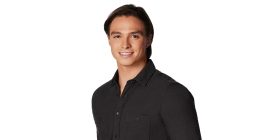
Judy Blume has been famously averse to adaptations of her works, particularly of Are You There God? It’s Me, Margaret. But, a half-decade after it was published, a movie version of her beloved novel is heading to theaters.
The story follows 11-year-old Margaret, who is mired in personal anxiety after her family’s move from New York City to the suburbs amid her desire to get her first period. In an attempt to cope with it all, Margaret, who has grown up without religion being raised by a Christian mother and Jewish father, begins to pray for some answers. Since its publishing debut in 1970, Are You There God? It’s Me, Margaret has become beloved not just among the Blume canon but among all books aimed at adolescent readership. At the same time, it has been restricted or banned by various schools in America because of its subject matter.
Like many, director Kelly Fremon Craig first read the book when she was in the throes of adolescence. “I was such an awkward and uncertain kid,” she says, in a phone call with The Hollywood Reporter. “There was something about reading about a character that was going through all the things that I was going through that just was so reassuring to me.” Craig broke out with her directorial debut, dramedy The Edge of Seventeen, which, like Margaret, laid bare the realities of growing up as opposed to the often glamorized and gruesomely mature Hollywood portraiture of teenage-dom.
In an interview ahead of Margaret‘s release, Craig talks about convincing Blume to make the movie and dealing with puberty on set.
What was behind your desire to adapt Are You There God? It’s Me, Margaret.?
After I made The Edge of Seventeen, there was this moment when I was thinking about what to do next. I started to think about the authors who had most impacted me, who I loved the most and Judy Bloom was the first person that I thought of. I started rereading all of her books, now with an eye to adapt them. When I got to Are You There God? It’s Me, Margaret, I read the last page and was just sobbing. I spent walking around in circles trying to figure out what happened to me. What I came to realize was there was something really profound about the uncertainty of adolescence. So, I wrote Judy Blume a letter telling her all of that.
Was it essentially a cold call?
It was actually synchronistic because right at the time I started to reread her work, she tweeted that she was considering opening up her work to be adapted. So, I knew that she was tinkering with the idea but then I very quickly found out from her representatives that the one book that she was never going to option was Margaret. It’s just too important to her and too important to too many people. I think she was just worried somebody would screw it up. But I just couldn’t leave it alone. After reaching out to her, I didn’t know that I’d received a letter back, but the next day I had an email from her in my inbox and her response made me think that maybe there was a window. I called Jim Brooks, who had produced Edge of Seventeen, and we got on a plane to go see her so fast.
What was it that got the “yes”?
I think that she felt encouraged having seen Edge of Seventeen. I think that made her feel confident that I wasn’t going to make it glossy and poppy. I think that may have been her biggest fear— that it would be turned into this bubblegum movie.
What did you not want this movie to be?
I really didn’t want it to be too neat and tidy. My own adolescence was a mess, and I was a mess. There are details of adolescence that I felt had to be represented in a really truthful way. Your hair is greasy. You did it yourself. It’s just a really awkward time. I wanted all that to be represented. I wanted it to feel like these were real kids. When we were casting, we searched all over the country and, most of these kids, this is the first thing that they’ve ever done. I pushed them to do a lot of improvising. I really wanted it to feel alive and messy.
In Hollywood, it’s common to see 20-year-olds playing 15-year-olds. How important was it to cast kids that were the actual ages of these characters?
We were reaching out to kids that were exactly this age, that were 11 and 12. It was tricky, particularly with Abby [Ryder Fortson], who plays Margaret, we found her when she was 11 and we were planning to go into production that summer, but this was in March of 2020. So the world shut down and it felt like we were in a race against puberty. By the time we make this movie, is it going to make sense that Margaret is praying to God for boobs? Or is it gonna look like God has already delivered? It did turn out that when she showed up in the costume department to try on outfits, God had answered. So we spent a lot of time hiding that. We had to bind her. This kid has such a beautiful performance and had to have an Ace bandage wrapped around her when it’s 90 degrees out in North Carolina is not easy. Then we had to do visual effects in some places.
The film lovingly and hilariously portrays what it is to prepare for and to get your first period, which is rarely seen onscreen. What was it like producing that behind the scenes?
When I first adapted the book and I would go to these meetings and I had to say the word “period”, I was embarrassed. And I couldn’t believe it. I was like, ‘I’m an adult woman and I’m embarrassed saying this word out loud!’ But over the course of making this film, because we’ve talked about it so much, I’ve become completely desensitized. There was a moment in particular when we were on set, and we filmed the scene where Margaret tries on a pad for the first time and puts it in her underwear and then walks around. That felt so electrifying to watch on the monitors. I’m 42 and I’ve never seen another person do that, that’s wild to me, this thing that half the population does, I’ve never seen. I’ve seen myself do it and that’s it. I kind of feel like we’re breaking new ground, which sounds crazy because how have we not seen this thing that half the population does?
The stakes in this film — puberty, periods, bras, etc. — are low, especially by current Hollywood standards. But Margaret still feels like a high-wire act.
I definitely feel like adolescence feels like the highest stakes. I just remember all of those moments being so heart-pounding, so that feeling was always at the center of what I would talk about with Abby. But a lot of it is a credit to her because she could translate those conversations into something that came through in her expression. It really made you feel that this was everything to her. That she might die if this doesn’t go well.
Read More: World News | Entertainment News | Celeb News
Hollywood




